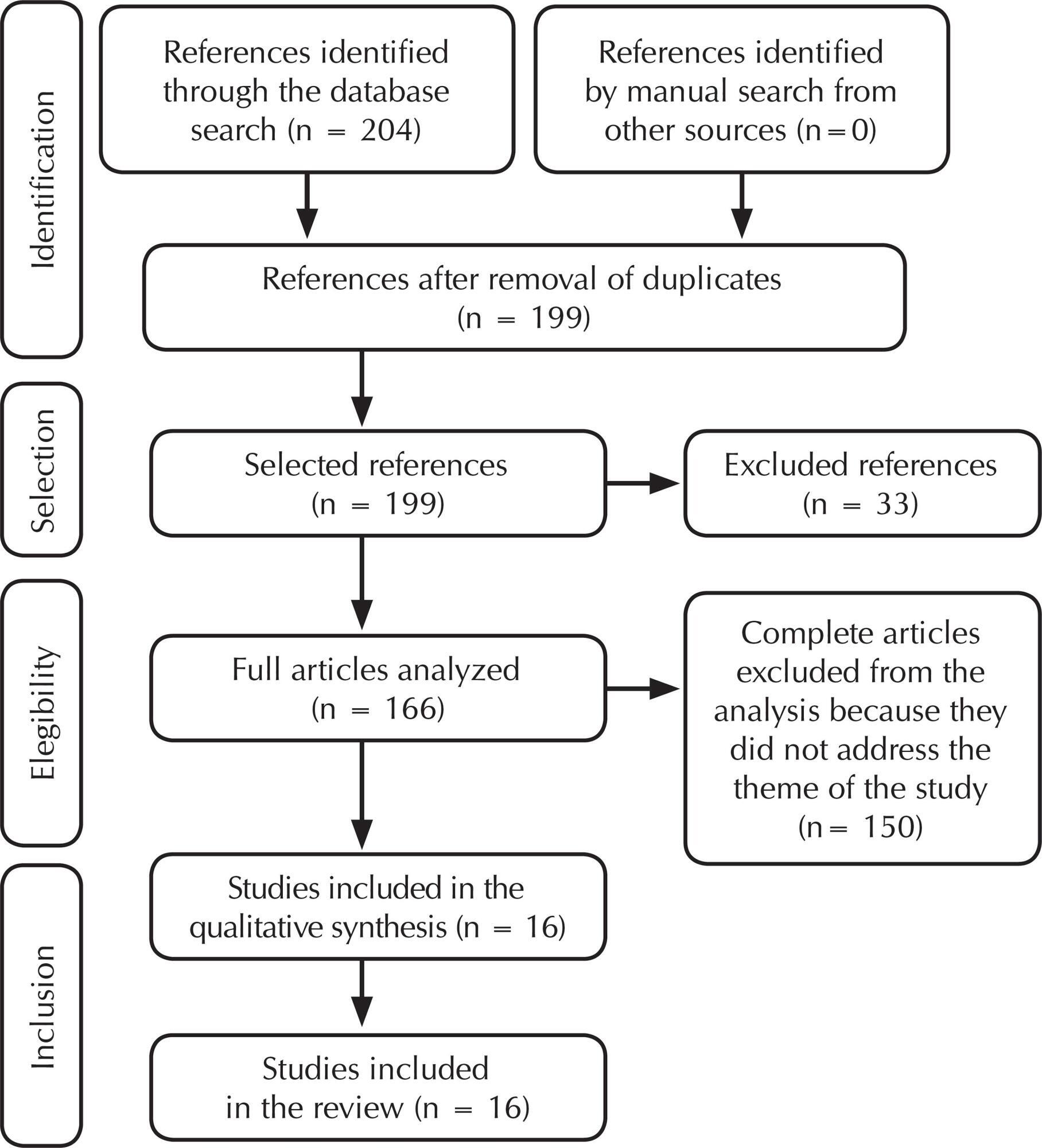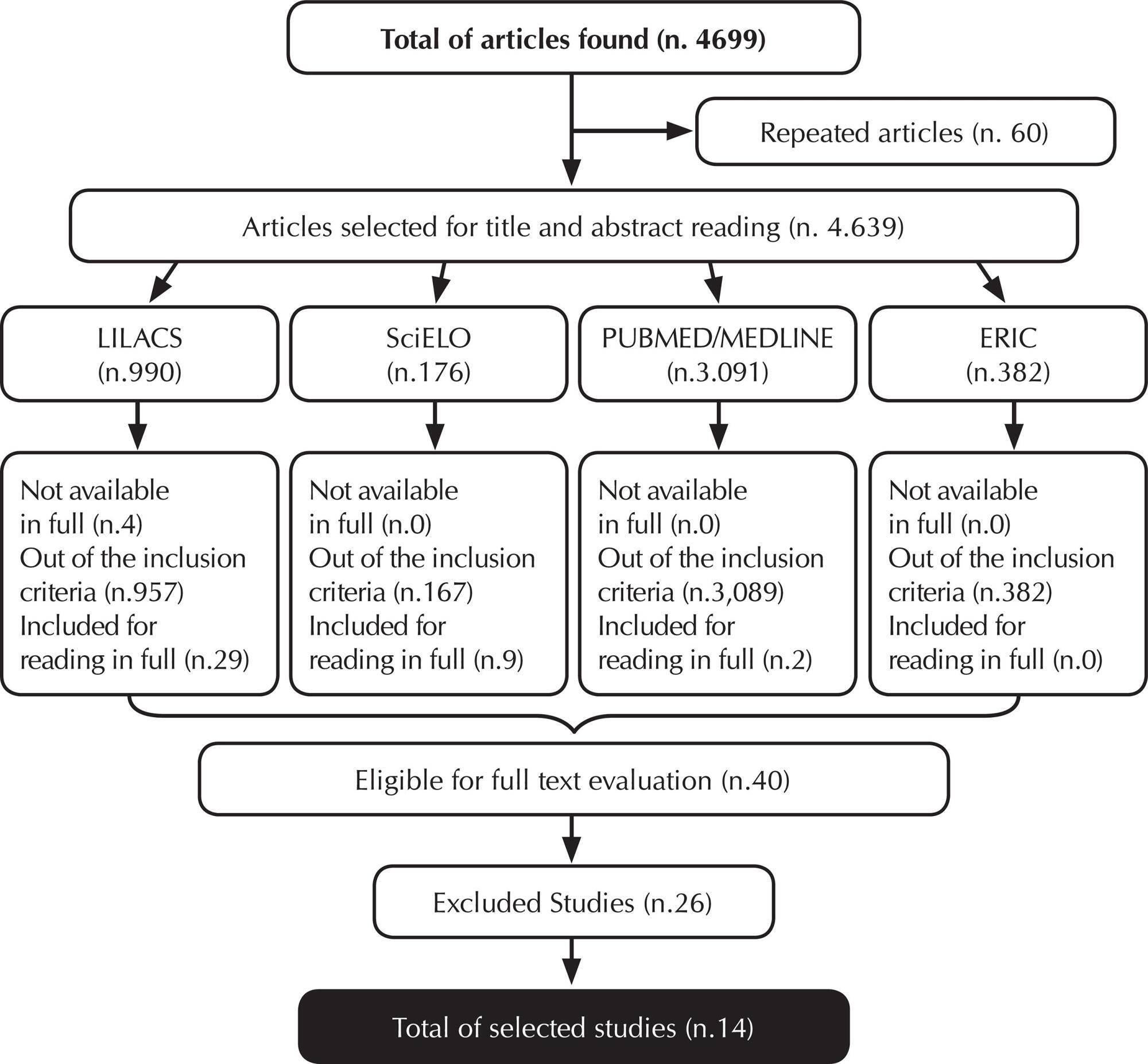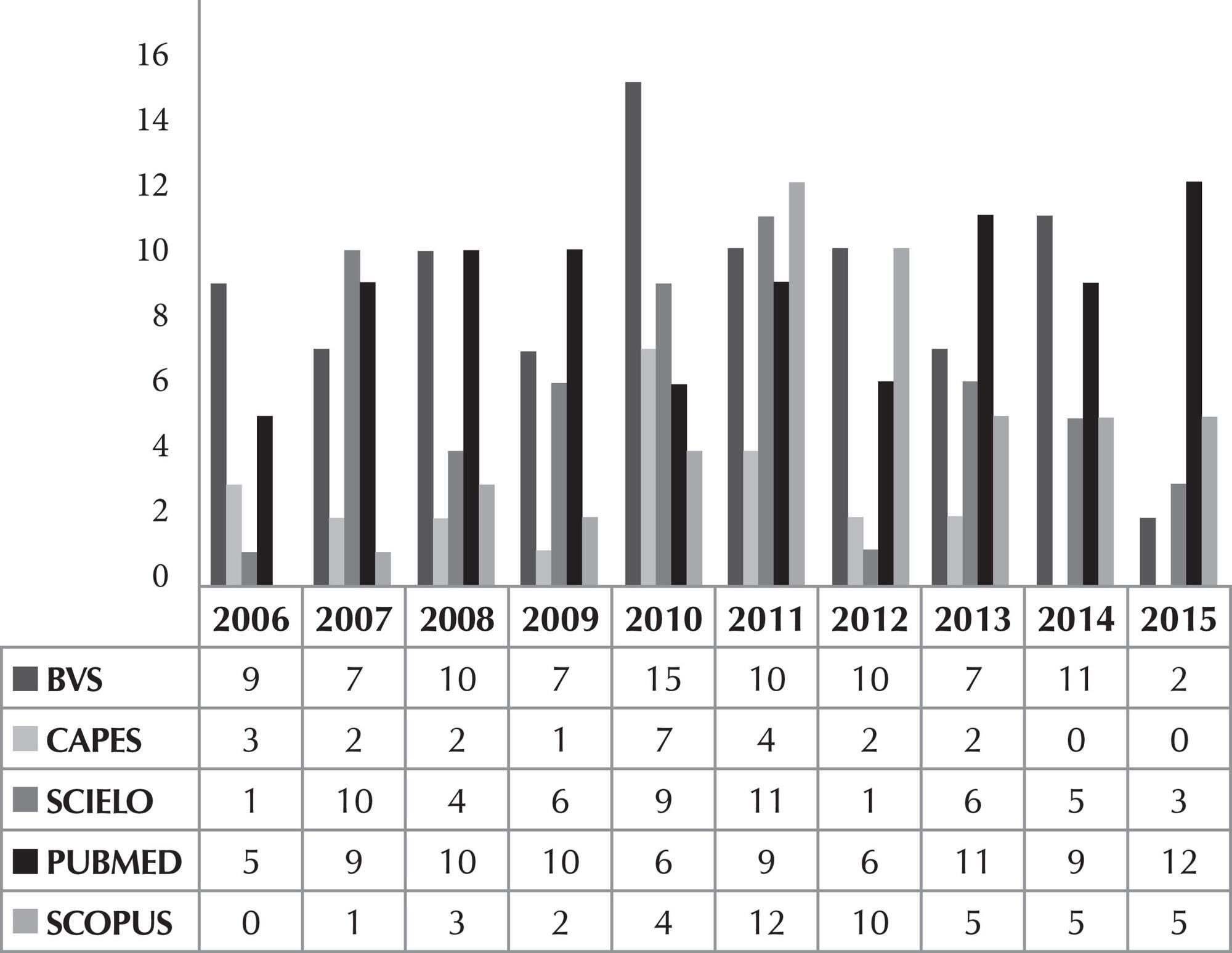-
EXPERIENCE REPORT01-01-2018
Death education: sensibility for caregiving
Revista Brasileira de Enfermagem. 2018;71:1779-1784
Abstract
EXPERIENCE REPORTDeath education: sensibility for caregiving
Revista Brasileira de Enfermagem. 2018;71:1779-1784
DOI 10.1590/0034-7167-2017-0018
Views0See moreABSTRACT
Objective:
to report the application of a participatory teaching-learning method on the themes death, dying, and associate care to highlight its applicability to the students.
Method:
report of application of participatory method in 22 students from the 6th period of the undergraduate program in Nursing and Obstetrics of a public university. The first stage focused on personal experiences of the students and the second on professional prospects. As resources for data collection we used music, drawing, drama, and photography.
Results:
after applying the method, the students assigned meanings to death and nursing care, reflected, criticized, and resignified experiences on the theme.
Conclusion:
the method was considered applicable and effective to achieve the objective, that is, it enables learners to act as protagonists of the teaching-learning process, building together a new perspective of end-of-life care.
-
EXPERIENCE REPORT01-01-2018
Community intervention in the Nursing education: experience report
Revista Brasileira de Enfermagem. 2018;71:1774-1778
Abstract
EXPERIENCE REPORTCommunity intervention in the Nursing education: experience report
Revista Brasileira de Enfermagem. 2018;71:1774-1778
DOI 10.1590/0034-7167-2017-0351
Views0See moreABSTRACT
Objective:
To report the implementation and results of community intervention projects used as a strategy for teaching and developing people and communities in the training of community health nursing specialists at the Centro de Formação de Saúde Multiperfil (Multi-profile Health Training Center), Angola.
Method:
Report of experience of the use of community intervention projects in nursing.
Results:
Community intervention projects have contributed to the learning of students and to the promotion of health, citizenship and the empowerment of individuals and communities. Its implementation is in the fourth year, and 16 projects have already been developed in 2 distinct neighborhoods, and this year the intervention will cover a third.
Conclusions:
Nursing teaching should adopt strategies that lead the student not only in the path of professional autonomy, but, above all, in the empowerment of people and communities. Community intervention is undoubtedly important in this area.
-
EXPERIENCE REPORT01-01-2018
The Pororoca effect on permanent education in health: about the interaction research-work
Revista Brasileira de Enfermagem. 2018;71:1768-1773
Abstract
EXPERIENCE REPORTThe Pororoca effect on permanent education in health: about the interaction research-work
Revista Brasileira de Enfermagem. 2018;71:1768-1773
DOI 10.1590/0034-7167-2017-0462
Views0See moreABSTRACT
Objective:
to build municipal responsibility with the permanent education in health policy from the interaction between research and innovation of work practices.
Method:
experience reports structured through dialogic meetings that allowed the participative diagnosis and strategic administration considering research in health education.
Results:
from the activities and interactions, we identified active forces in the reinvention of training for workers in the municipal network of health services, in which we found three streams: “inside and outside interactions”, “movement towards meetings” and “strategic collective arrangements”.
Final considerations:
through action research and a collaborative critique, collective movements were constructed, they showed ways to produce new directions in health education and allowed the strategic creation of the Núcleo de Educação Permanente as a responsibility of the municipal government, not depending on Federal policies.
-
REVIEW01-01-2018
Educational technologies and practices for prevention of vertical HIV transmission
Revista Brasileira de Enfermagem. 2018;71:1759-1767
Abstract
REVIEWEducational technologies and practices for prevention of vertical HIV transmission
Revista Brasileira de Enfermagem. 2018;71:1759-1767
DOI 10.1590/0034-7167-2016-0333
Views0See moreABSTRACT
Objective:
to assess available evidence on educational technologies and practices for prevention of vertical HIV transmission.
Method:
LILACS, PubMed, Scopus, BDENF, between April and May 2016, with the descriptors: “Vertical Transmission of Infectious Disease”, “HIV”, “Health Education” and “Technology”.
Results:
there are 16 articles published between 2000 and 2014, mostly Brazilian and African, Cross-sectional and with low level of evidence. The studies covered the use of hard technologies, through video, radio and telephone, and soft, emphasizing, in particular, counseling.
Conclusion:
the studies recognize the importance of educational activities as a tool for health promotion in the context of vertical HIV transmission, despite reporting the need for constant training of professionals and urgency in the renewal of educational concepts and practices. Therefore, it is recommended to expand and consolidate health counseling and emphasize the role of nurses as an important actor in this setting.

-
REVIEW01-01-2018
Liberating critical pedagogy of Paulo Freire in the scientific production of Nursing 1990-2017
Revista Brasileira de Enfermagem. 2018;71:1751-1758
Abstract
REVIEWLiberating critical pedagogy of Paulo Freire in the scientific production of Nursing 1990-2017
Revista Brasileira de Enfermagem. 2018;71:1751-1758
DOI 10.1590/0034-7167-2017-0699
Views0See moreABSTRACT
Objective:
To analyze the theoretical and methodological application of Paulo Freire’s critical pedagogy in the scientific production of nursing.
Method:
An integrative review was carried out with consultation of the databases: LILACS, BDENF, MEDLINE, PUDMED and CINHAL. We included studies in the Spanish, English and Portuguese languages, published from 1990 to 2017.
Results:
A total of 38 articles were analyzed, of which the main concepts adopted were: dialogue/dialogicity, awareness/critical awareness and questioning. Regarding the application of the method, it was noticed the predominance of the adoption of elements such as culture circles, thematic phase and horizontality relation of the nurse with the individuals involved.
Conclusion:
Nursing has partially appropriated the Freire’s referential. However, it reveals the intentionality of a transformative practice that requires deepening for the implementation of the method in its full.

-
REVIEW01-01-2018
Supervised internship in undergraduate education in nursing: integrative review
Revista Brasileira de Enfermagem. 2018;71:1740-1750
Abstract
REVIEWSupervised internship in undergraduate education in nursing: integrative review
Revista Brasileira de Enfermagem. 2018;71:1740-1750
DOI 10.1590/0034-7167-2017-0340
Views0See moreABSTRACT
Objective:
to analyze the evidence available in the literature on the contributions of the Supervised Internship in nursing training in Brazil and the teaching-learning methods employed.
Method:
integrative review of the literature, with search of articles published between 2002 and 2016, in PubMed, LILACS, SciELO and Eric databases.
Results:
Of the 4,699 articles consulted, 14 met the inclusion criteria. The analysis of these studies revealed three thematic categories: the understanding about the role of Supervised Internship; the teaching-learning processes employed; and their contributions to the training of nurses.
Final considerations:
this is a fundamental element in the academic training, since, depending on the didactic-pedagogical organization, it makes possible the (re) signification of the acquired knowledge throughout the course and realizes the professional competences. The teaching-learning methods are structured by the critical pedagogy, being the active methodologies the main choices of the authors.

-
REVIEW01-01-2018
Nursing higher education in MERCOSUR: a bibliometric study
Revista Brasileira de Enfermagem. 2018;71:1732-1739
Abstract
REVIEWNursing higher education in MERCOSUR: a bibliometric study
Revista Brasileira de Enfermagem. 2018;71:1732-1739
DOI 10.1590/0034-7167-2017-0405
Views0See moreABSTRACT
Objective:
to identify productions that approach nursing high education in member states of MERCOSUR.
Method:
bibliometric study with quantitative approach carried out in search mechanisms, such as BVS, Capes, SciELO, Scopus and PubMed, between 2006 and 2015. It was found 301 articles about nursing education in MERCOSUR.
Results:
point to concern for the nurse’s education for public health policies, for teacher’s education and the teaching-learning process. However, publications regarding technologies associated with distance education on health field are low.
Conclusion:
this study contributes with discussion in nursing education field when points to the themes regarding the production about nurses’ education in MERCOSUR, specially, the range of targets set up in the Educational MERCOSUR agreement.

-
REVIEW01-01-2018
Educational technologies for health education on stroke: an integrative review
Revista Brasileira de Enfermagem. 2018;71:1724-1731
Abstract
REVIEWEducational technologies for health education on stroke: an integrative review
Revista Brasileira de Enfermagem. 2018;71:1724-1731
DOI 10.1590/0034-7167-2017-0041
Views0See moreABSTRACT
Objective:
to identify in the scientific literature the educational technologies used in the health education process related to stroke.
Method:
integrative review, whose eligibility criteria of the articles were: match the keywords “health education” and “stroke”; be a research paper; be in Portuguese, English and Spanish; be available electronically in the databases LILACS, PubMed/Medline, Scopus and CINAHL; year of publication between 2000 and 2016.
Results:
24 publications were found. The analysis was carried out by means of analytical and interpretive readings. There were many educational technologies used in the health education process for stroke.
Final considerations:
the printed material for general public stood out, aiming to the recognition of alert signs of the disease and the emergency decision-making before suspicious cases of the disease.
-
ORIGINAL ARTICLE08-08-2022
Social and territorial inequalities in the mortality of children and adolescents due to COVID-19 in Brazil
Revista Brasileira de Enfermagem. 2022;75(6):e20210482
Abstract
ORIGINAL ARTICLESocial and territorial inequalities in the mortality of children and adolescents due to COVID-19 in Brazil
Revista Brasileira de Enfermagem. 2022;75(6):e20210482
DOI 10.1590/0034-7167-2021-0482
Views0See moreABSTRACT
Objective:
To analyze the mortality rate of COVID-19 among children and adolescents aged 0 to 14 years.
Methods:
Ecological and exploratory study of children’s mortality rate by COVID-19 in Brazil, from February to October 2020. The study used the Severe Acute Respiratory Syndrome database to collect the data and made the analysis using descriptive spatial statistics by age and race/color classification.
Result:
The mortality rate due to COVID-19 represented 1.34 deaths per one hundred thousand in the total group evaluated. The age group with the highest frequency and mortality rate was 1 to 4 years of age. There is a higher frequency of deaths in the brown and Indigenous population.
Conclusion:
The distribution of deaths due to COVID-19 is unequal in the national territory, and there is a wide variation in the mortality rate by age and race/color groups.

-
ORIGINAL ARTICLE12-08-2023
Construction and validity of educational technology about the human papillomavirus vaccine for adolescents
Revista Brasileira de Enfermagem. 2023;76:e20230048
Abstract
ORIGINAL ARTICLEConstruction and validity of educational technology about the human papillomavirus vaccine for adolescents
Revista Brasileira de Enfermagem. 2023;76:e20230048
DOI 10.1590/0034-7167-2023-0048
Views1See moreABSTRACT
Objectives:
to construct and validate an educational technology in comic book format about the human papillomavirus vaccine aimed at adolescents.
Methods:
a methodological study, with a quantitative approach, through the agreement method. It was carried out in two phases: educational technology construction and content validity. Participants are expert judges in the health field. Data collection took place in a virtual environment, through a questionnaire. Data analysis was performed by calculating the Content Validity Index. A Content Validity Index of at least 80% was accepted.
Results:
the comic book’s overall Content Validity Index was 82%, reaching the minimum limit established to be validated.
Conclusions:
comics are fundamental in the teaching-learning process, aiming to catch adolescents’ attention. Therefore, it is characterized as a valid tool to inform, in a playful manner, about the human papillomavirus vaccine.

-
ERRATUM02-26-2024
ERRATUM
Revista Brasileira de Enfermagem. 2024;77(1):e20160061
Abstract
ERRATUMERRATUM
Revista Brasileira de Enfermagem. 2024;77(1):e20160061
DOI 10.1590/0034-7167.20247701e03
Views2In the article “Nurses in the labor market: professional insertion, competencies and skills”, with DOI number: , published in Revista Brasileira de Enfermagem, 2017;70(6):1220-6, on page 1225:Include before REFERENCES:[…]See more -
ORIGINAL ARTICLE01-10-2024
Nursing care management strategies to address the COVID-19 pandemic
Revista Brasileira de Enfermagem. 2024;77:e20230254
Abstract
ORIGINAL ARTICLENursing care management strategies to address the COVID-19 pandemic
Revista Brasileira de Enfermagem. 2024;77:e20230254
DOI 10.1590/0034-7167-20230254
Views1See moreABSTRACT
Objective:
To characterize nursing care management strategies for addressing the COVID-19 pandemic.
Method:
A descriptive, qualitative study conducted with 22 nurse professionals at a University Hospital in Southern Brazil. Data collection through interviews in June and August 2021, analyzed according to Bardin’s Content Analysis and the theoretical framework of complex thinking.
Results:
The identified strategies were organized into four categories: Reorganization of health services; People management and emergency admission; Multiprofessional articulation; and Bedside nursing care.
Final Considerations:
Professional performance revealed a complex interplay between leadership and care management practices, even in the face of working condition restrictions, and were understood as crucial in the pandemic scenario.
-
REVIEW01-10-2024
Prevalence and exposure variables of latent infection by mycobacterium tuberculosis in healthcare workers
Revista Brasileira de Enfermagem. 2024;77:e20240052
Abstract
REVIEWPrevalence and exposure variables of latent infection by mycobacterium tuberculosis in healthcare workers
Revista Brasileira de Enfermagem. 2024;77:e20240052
DOI 10.1590/0034-7167-2024-0052
Views1See moreABSTRACT
Objectives:
To identify in the scientific literature the prevalence, diagnostic methods, and exposure variables of latent infection by Mycobacterium tuberculosis in healthcare workers.
Methods:
An integrative review of the scientific literature based on the following review question: What are the available scientific evidence in the literature that address the prevalence of latent infection by Mycobacterium tuberculosis in healthcare workers and its association with possible risk factors among these workers?
Results:
Being a physician or nurse, being older, and being male were generally associated with higher prevalences. The study also showed that interferon-gamma release assays were more commonly used as a diagnostic method compared to skin tests.
Conclusions:
More studies are needed regarding the epidemiology of latent infection by Mycobacterium tuberculosis in the context of healthcare workers, aiming for higher impact actions that contribute to the reduction of tuberculosis worldwide.

-
01-01-2016
Nursing care in Specialized HIV/Aids Outpatient Services
Revista Brasileira de Enfermagem. 2016;69(3):515-521
Abstract
Nursing care in Specialized HIV/Aids Outpatient Services
Revista Brasileira de Enfermagem. 2016;69(3):515-521
DOI 10.1590/0034-7167.2016690314i
Views1See moreABSTRACT
Objective:
to analyze the discourses about the care provided by nurses operating in Specialized HIV/Aids Outpatient Services in four public institutions of the city of Fortaleza, Ceará, Brazil.
Method:
descriptive and exploratory study with a qualitative approach, which used as a method the discourse analysis.
Results:
when titling the “care as negative”, such title came from the analogy proposed by Freud (1912) with the photographic negative, represented by what that care can configure from the unconscious movement, since nurses did not perceive themselves in the care actions developed by supporting the work of other occupational categories, contributing to maintain the ideology of biomedicine.
Conclusion:
it is necessary to justify and theorize a nursing clinical practice from epistemological issues of the profession, in such a way that nurses can understand their relevance within the care provided.
-
ORIGINAL ARTICLE04-16-2021
Practices used by a home care team: implications for caregivers
Revista Brasileira de Enfermagem. 2021;74(2):e20190794
Abstract
ORIGINAL ARTICLEPractices used by a home care team: implications for caregivers
Revista Brasileira de Enfermagem. 2021;74(2):e20190794
DOI 10.1590/0034-7167-2019-0794
Views0See moreABSTRACT
Objectives:
to analyze the practices of a home care team and their implications for caregivers’ performance.
Methods:
qualitative study with data obtained from observation of 21 users, 30 caregivers and 6 professionals from the home health care service in a municipality in Minas Gerais, from February to June 2018. The material was analyzed from the perspective of discourse analysis according to Michel Foucault.
Results:
team interference upon caregivers is exercised by disciplinary practices and prescriptive, authoritative and surveilling behaviors. The team’s knowledge-power relationship determines caregivers’ acceptance through convincing or through difficulty of understanding assigned orientations. Educational practices would enable caregivers to be constituted as active, participative, empowered and reflective subjects.
Final Considerations:
team practices interfere with caregivers’ ways of acting and being and they have implications in objectification and subjectification processes.
-
08-16-2021
Pregnant women’s contribution in the construction and evaluation of an educational technology: the “Comics for Pregnant Women”
Revista Brasileira de Enfermagem. 2021;74:e20201243
Abstract
Pregnant women’s contribution in the construction and evaluation of an educational technology: the “Comics for Pregnant Women”
Revista Brasileira de Enfermagem. 2021;74:e20201243
DOI 10.1590/0034-7167-2020-1243
Views1See moreABSTRACT
Objectives:
to describe the contribution of pregnant women to the construction and evaluation of educational technology.
Methods:
a participatory study developed in three stages, which occurred between March 2018 and June 2019 for identifying the content, construction, and evaluation of the comic. Non-directive interviews were conducted in educational groups with 34 pregnant women. After the comic was built by a team, including a designer, an instrument was applied to 41 pregnant women to evaluate the items Objectives, Organization, Writing style, Appearance, and Motivation.
Results:
the comic contains 40 pages of contents, illustrations, and quizzes (word search, cross-puzzle, seven mistakes, etc). The pregnant women evaluated it as easy to understand, self-explanatory, aesthetically attractive, and capable of motivating good care practices during pregnancy, obtaining a minimum agreement of 92.1%.
Final Considerations:
the innovation of the educational technology consisted of incorporating the voices of pregnant women in prenatal care, with the potential to stimulate reflections and the learning process of this target audience.

Search
Search in:
Nuvem de Tags
Adolescente (85) Atenção Primária à Saúde (239) COVID-19 (91) Criança (91) Cuidados de Enfermagem (269) Educação em Enfermagem (151) Educação em Saúde (139) Enfermagem (930) Enfermagem Pediátrica (86) Estudantes de Enfermagem (77) Estudos de Validação (131) Família (87) Idoso (208) Promoção da Saúde (99) Qualidade de Vida (104) Saúde do Trabalhador (86) Saúde Mental (145) Saúde Pública (82) Segurança do Paciente (150) Tecnologia Educacional (100)



